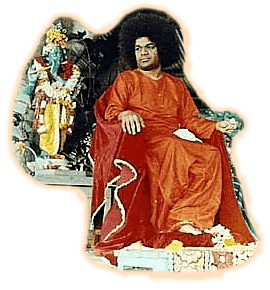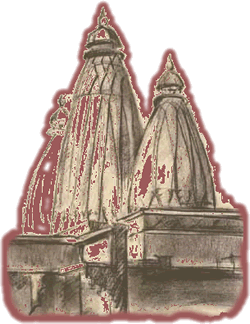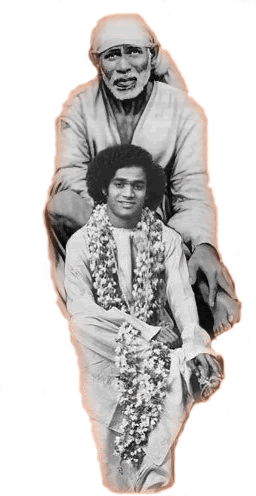|
Other Baba-books
|
||||||||
 |
The original
Sanskrit verses and with comments taken from the writings of
|
|||||||
|
'There is the
Fortune of the World
1 2a 2b 3 4 5 6 7 8 9 10 11 12 13 14 15 16 17 18a 18b
"There is a widespread
misconception that spiritual values have no place in modern society. It
is erroneously supposed that spirituality is incompatible with secular
society. Krishna removes this misconception in Sānkhya Yoga.
Many fallaciously imagine that spirituality is only concerned with
salvation. Spirituality is, in fact, the backbone of society and is
indispensable for social progress and solidarity. Its importance for
and relevance to society cannot be exaggerated." - Summer Showers in
Brindavan 1979, p. 24 " Listen to this spoken
chapter in Audio " sa˝jaya uvāca śrī
bhagavān uvāca In the Bhagavad Gītā,
Arjuna finds himself on the horns of a spiritual dilemma. He is worried
about his sva-dharma. He finds himself in an unenviable
predicament. He hesitates to kill his own relatives and be guilty of
fratricide. So he begins to detest the homicidal glory of a
battlefield. - Summer
Showers
in
Brindavan
1979,
p. 26 klaibyam mā
sma gamah pārtha arjuna uvāca The sammoha of
Arjuna was the feeling of "I" and "mine". All of a sudden he began to
feel that he was a killer, that he would be responsible and that they
were his teachers and elders and relations. This mamakara has
to go, the "I" has to be crossed and all words, thoughts, and deeds
have to be dedicated to the Lord. - Sathya Sai Speaks I, p. 171 gurūn
ahatvā hi mahānubhāvān Arjuna also was telling
Krishna that it is better to beg for food and live than to achieve
victory by killing all those who are near and dear. Krishna, in a
prophetic manner addressing Arjuna said, "What is ordained by fate is
inescapable; Justice will be done; Victory will go to the righteous
ones; Truth will survive. - Summer Showers in
Brindavan 1978, p. 37 na caitad
vidmah kataran no garīyo kārpanya-doshopahata-svabhāvah
For Arjuna sought from Krishna not preyas, the pleasing
worldly glory of power and status and wealth, but śreyah, the
lasting glory of full joy. He said, "Preyas is available for
human effort; it can be won by human activity or karma. Why
should I crave from You what I can win by my own endeavor? I am not so
foolish as all that. Grant me the sreyas that is beyond the
reach of my effort. Sreyas is not the fruit of karma,
it is the fruit of grace!" Thus, Arjuna rose to the height of saranagathi,
absolute
self-surrender,
the
state
called prapathi (prapannam).
-
Gītā Vahini, p. 18
As long as the consciousness of the deha or body persists,
the bhakta is the servant and the Lord is Master. As long as
the individual feels that he is separate from other individuals, the bhakta
is a part and the Lord is the Whole. When he progresses to the state
when he gets beyond the limits of the body as well as of "I" and
"mine", then there is no more distinction; bhakta and bhagavān
are the same. In the Ramāyana, Hanumān achieved the
third stage through bhakti.
This same subject is mentioned in the seventh sloka
of the second chapter of the Gītā. The word prapannam used
there indicates that Arjuna has the qualification, the discipline of bhakti. - Gītā Vahini, p. 20 na hi
prapaśyāmi mamāpanudyād What exactly is the
cause of all grief? It is the attachment to the body that produces
grief as well as its immediate precursors: affection and hate. These
two are the results of the intellect considering some things and
conditions as beneficial, and some other things and conditions as not.
This is a delusion, this idea of beneficence and maleficence. Still you
get attached to objects that are considered beneficial and you start
hating the others. But from the highest point of view, there is
neither; the distinction is just meaningless. There is no two at all;
how can there be good and bad then? To see two where there is only one,
that is māyā, or ignorance (illusion). The ignorance that
plunged Arjuna into grief was of this nature - seeing many, when there
is only one. - Gītā Vahini, pp. 20-1 sa˝jaya uvāca If Arjuna has, by his
efforts, won control over his senses and earned the name Gudākeśa,
Krishna,
as
Hrishīkeśa, is the presiding deity of all the
senses! On the field of Kurukshetra both are in the same
chariot, one as learner and the other as teacher! - Gītā Vahini, p. 20 tam uvāca
hrishīkeśah This is the
distinguishing mark that separates the 'wise' (j˝āni) from the 'unwise'
(aj˝āni). Krishna spoke, laughing with an out-burst of joy; Arjuna
listened while overpowered by sorrow. The j˝āni is always full
of joy; he laughs. The aj˝āni is afflicted with sorrow; he weeps. - Sanathana Sarathi, July 1980, p. 147 śrī-bhagavān
uvāca What exactly is the
cause of all grief? It is the attachment to the body that produces
grief as well as its immediate precursors: affection and hate. These
two are the results of the intellect considering some things and
conditions as beneficial, and some other things and conditions as not.
This is a delusion, this idea of beneficence and maleficence. Still,
you get attached to objects that are considered beneficial and you
start hating the others. But from the highest point of view, there is
neither; the distinction is just meaningless. There is no two at all;
how can there be good and bad then? To see two where there is only one,
that is māyā, or ignorance (illusion). The ignorance that
plunged Arjuna into grief was of this nature -seeing many, when there
is only one. - Gītā Vahini, pp. 20-1 Thus, Krishna started
giving him, in the very first instance the most effective drug, j˝āna.
This
is
detailed
from
the eleventh sloka of the second chapter.
This is a key sloka for all students of the Gītā. Krishna
condemns outright two objections that were haunting Arjuna for long,
saying that the destruction of the body does not mean the destruction
of the ātmā and that he is grieving for those he need not
grieve for. Praj˝ā-vādāmś ca bhāshase: "You talk like a wise
man. You say this is dharma and the other is adharma,
as if you know how to distinguish between them," said Krishna. - Gītā Vahini, p. 22 na tv
evāham jātu nāsam Bhīshma, Drona
and the rest have come like true soldiers and kshatriyas to
engage in battle. They do not weep like you. Consider that. They will
never grieve or withdraw. Arjuna! This is the testing time for you,
remember! Let me tell you this also. There never was a time when I was
not. Why? There was never a time when even you and all these kings and
princes were not. Tat is the Paramātmā, tvam is
the jivātmā; and both were the same, are the same, and will be
so forever. Prior to the pot, in the pot and after the pot, it was,
is, and will be mud. - Gītā Vahini, p. 24 dehino
'smin yathā dehe
Though it is associated with the body, the ātmā is
unaffected
by
the
gunas and the dharmas; that is to
say, it has no qualities and characteristics. You are unaffected by the
changes that the body undergoes when you grow from the infant to the
boy, from the boy into youth, from the youth to the middle-aged man and
thence to the old man. You persist, in spite of all this. It is the
same when the body is destroyed; the ātmā persists. So the hero
will not pine for the change called death". Krishna said this with such
emphasis that the chariot shook! Arjuna was still doubt-ridden. "O
Lord," he began, "You said that the bodily changes are like the stages
of wakefulness, dream and sleep. The experiences of previous births are
destroyed in memory by the incident called death." Krishna replied that
it was not possible to recall to memory all experiences, but it was
possible to recall some. For the ātmā persisted, though the
vehicle changed. Arjuna then shifted to
another point; a point that pesters many besides Arjuna. That is why,
Krishna says, "dhīras tatra na muhyati", [the dhīrah is
not deluded by this]. He does not say that Arjuna should not be deluded
by this. He intends to teach all wavering minds. Krishna solves every
doubt as soon as it arises. He said, "Arjuna! While passing through the
three stages, buddhi somehow manages to keep some points in its
hold. But it too is destroyed when death comes to the body. At one
stroke, all is forgotten. Memory is the function of the intellect, not
the ātmā. -
Gītā
Vahini,
p.
26 mātrā-sparsās
tu
kaunteya The object-ward movement
of the senses is the cause of grief and its twin, joy. It is like heat
and cold; when it is the cold season, you crave for warmth, and in the
hot season you crave for coolness. The sense object contact is exactly
like this. As long as the world is there, objective contact cannot be
avoided. Still, one can master the art, the discipline, the secret, of
avoiding them or bearing them without bother... Arjuna! Wear the armor
of fortitude, of titiksha, and the blows of good and bad
fortune can never harm you. Titiksha
means equanimity in the face of opposites, putting up boldly with
duality. It is the privilege of the strong, the treasure of the
brave... Fortitude is different from patience. Titiksha is not
the same as sahana. Sahana is putting up with
something, tolerating it, bearing it, because you have no other go;
having the capacity to overcome it, but yet, disregarding it - that is
the spiritual discipline. Patiently putting up with the external world
of duality combined with inner equanimity and peace - that is the path
to liberation. Bearing all, with analytic discrimination - that is the
type of sahana that will yield good result. - Gītā Vahini, pp. 27-8 yam hi na
vyathayanty ete Generally, man seeks
only happiness and joy; under no stress will he desire misery and
grief! He treats happiness and joy as his closest well-wishers and
misery and grief as his direct enemies. This is a great mistake. When
one is happy, the risk of grief is great; fear of losing the happiness
will haunt the man. Misery prompts inquiry, discrimination,
self-examination and fear of worse things that might happen. It awakens
you from sloth and conceit. Happiness makes one forget one's
obligations to oneself as a human being. It drags man into egoism and
the sins that egoism leads one to commit. Grief renders man alert and
watchful. So misery is a great
friend; happiness spends out the stock of merit and arouses the baser
passions. So it is really an enemy. Really, misery is an eye-opener; it
promotes thought and the task of self-improvement. It also endows one
with new and valuable experiences. Happiness draws a veil over
experiences that harden a person and make him tough. So, troubles and
travails are to be treated as friends - at least not as enemies. Only,
it is best to regard both happiness and misery as gifts of God. That is
the easiest path for one's own liberation. -
Gītā Vahini, p. 28-29 nāsato
vidyate bhāvo avināśi tu
tad viddhi antavanta
ime dehā It is enough. Get up and
get ready for the fray. Why slide to the ground under the weight of all
this useless ego? The Lord is the cause of all, not you. There is a
higher power that moves everything. Know this and bend your will to it. - Gītā Vahini, p. 24 ya enam
vetti hantāram This explains why
Krishna taught Arjuna the key science of atmaj˝āna. The ātmā
does not kill, nor does it die. Those who believe that it kills or dies
are unaware of its nature. The ātmā of Arjuna does not kill;
the ātmā of Bhīshma or Drona does not die,
the ātmā of Krishna does not prompt! These are just phases of
the cause-consequence duality. The ātmā cannot be the cause or
consequence of any karma; it is nir-vikara, incapable
of change. - Gītā
Vahini,
p.
31 na jāyate
mriyate vā kadācin There are six forms of
modulation or modification: Originating, existing, growing, altering,
declining, getting destroyed. These are the shad-vikaras.
Originating or janma is when it "was not" and later "is". When
it "is" and becomes "is not", it is called maranam or death. Janma
happens to organic beings, not inorganic things. But the ātmā has
no
organs,
it
is
nira-vayava. The ātmā is not born, so
how can it die? Whom does it kill? It is unborn, eternal. - Gītā Vahini, p. 31 vedāvināśinam
nityam vāsāmsi
jīrnāni yathā vihāya Just as a person
discards old clothes and wears new ones, the dehi (dweller in
the body) discards one body and dons another. The body is to the
individual what the clothes are to the body. -
Gītā Vahini, p. 31 nainam
chindanti śastrāni If you understand the
real nature of the ātmā, then you would not give way to grief.
All the weapons that you wield can harm but the material body; they
cannot harm the modification-less ātmā. Know this truth and
renounce this despondency. - Gītā Vahini, p. 31 acchedyo
'yam adāhyo 'yam avyakto
'yam acintyo 'yam avyaktah -- invisible; ayam
-- this soul; acintyah -- inconceivable; ayam -- this soul; avikāryah -- unchangeable; ayam -- this soul; ucyate -- is said;
tasmāt -- therefore; evam -- like this; viditvā -- knowing it well; enam -- this soul; na -- do not;
anuśocitum -- to lament; arhasi -- you deserve. atha cainam
nitya-jātam jātasya hi
dhruvo mrityur avyaktādīni
bhūtāni Of course, in the
deluded stage, the world appears as real and brahman as a
meaningless concoction. In the stage of intelligent clarity, the jagat
is grasped in its true sense as unreal. The fairy of delusion
overpowers you by her charms and by her arrows of falsehood and guilt.
It is only the person possessed of the vision of universal brahman
that can soon escape her wiles. Such a person fully knows that names
and forms arose a little time ago and disappear a little time after. In
the Gītā too it is said: "These, o Bharata, appear in the middle
only... " (11-28). The world is subject to evolution and involution. To
understand this, one need not wait till the end of the world; it is
enough if the angle of the vision is corrected. That is the gateway to
knowledge. That is real control of pranas, the consciousness
that the world is unreal, or mithya. - Prasanthi Vahini, pp. 86-7 āścaryavat
paśyati kaścid enam dehī nityam
avadhyo 'yam svadharmam
api cāvekshya The foremost duty of a
kshatriya is to stay on the side of dharma and destroy adharma.
Consider
your
good
fortune!
You have on this battlefield worthy foes
like Bhīshma and others. This same Bhīshma fought in
the past with his own guru, the brahmin who taught him all the
arts, the great Paraśurāma [B.P. 9-15] himself; in order, primarily,
to carry out his kshatriya duty. And now you, like a coward,
are afraid to take arms against such stalwarts. A kshatriya finds
his
duty
fulfilled
when
he upholds the cause of dharma in spite
of odds. That is the path of progress.
-
Gītā Vahini, p. 31 yadricchayā
copapannam
Kshatham
means dukham, "sorrow", and a kshatriya is he who saves
beings from sorrow. A chance like this to wage a war on behalf of dharma
against the forces of adharma comes but rarely to a man. You
have been blessed as a kshatriya to take part in this dharma-yuddham.
Just
imagine
how
much
merit you will acquire by the service to the
world, which you are set to do now. The war that is waged to establish santhi
and soukhya (peace and plenty) in the world is
referred to as dharma-yuddham, and this is just such a
struggle, where justice is bound to win.
The Kauravas have desisted from no sin, no
injustice and no vice. They insulted elders, deserted the virtuous,
defamed the chaste, and wounded the self-respect of the good. Countless
are their misdeeds. Now, the moment for retribution has come, if you
behave like a poltroon, you bring dishonor to your parents, to your
brothers, and indeed to the entire kshatriya caste. - Gītā Vahini, p. 32 atha cet
tvam imam dharmyam You imagine that it is a
sin to engage in war. That is a great error. The sin, on the other
hand, lies in avoiding the chance to destroy the wicked, in prolonging
the agony of the virtuous. Give up your dharma now, and you run
the risk of falling into perdition. Hold fast to it, and you are
untouched by sin. Be of fixed mind; do not give way to either one or
the other among all the dualities of the world. - Gītā
Vahini,
p.
32 akīrtim
cāpi bhūtāni bhayād
ranād uparatam avācya-vādāmś
ca
bahūn hato vā
prāpsyasi svargam One should engage in
activity, with a mind steady in the midst of fortune, good or bad. This
is what Krishna advised in the 37th sloka. - Gītā Vahini, p. 32 sukha-duhkhe
same
kritvā *
Sānkhya: one of six leading systems of spiritual
Vedic philosophy, attributed to Sage
Kapila. Its
chief object is the emancipation of the soul from the bonds of wordly
existence; Analytic knowledge; philosophocal analysis of the material
and the spiritual and the controller of both.
|
||||||||



 "Of the eighteen chapters of the Gītā,
"Of the eighteen chapters of the Gītā,


